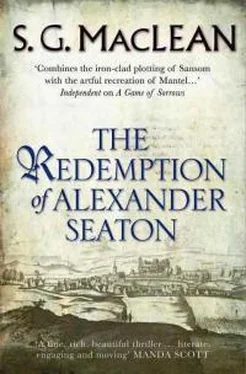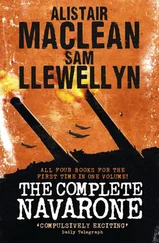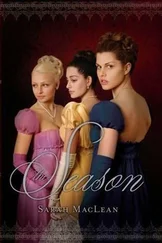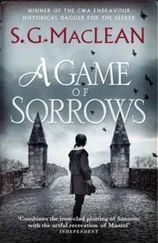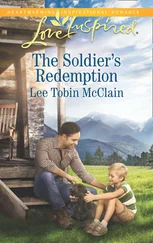Once having composed himself, the doctor, with Ishbel firmly clamped in a father’s embrace, called out, ‘Come now, Charles, let us have something to lift our hearts.’ Charles took a moment to come out of his spell, but smiling, took up his bow, called out a name to his players, who took up pipe, drum and tabor, and led them in a hearty harvest tune. The new sound was as a signal to mourners – guests and hosts both. Women bustled and boys ran up and down from the kitchen to the courtyard, and soon the trestles were filled with salvers, bowls and baskets of every sort of food imaginable: pies filled with pigeon, fish, rabbit; all manner of breads, pastries, puddings; custards, cakes, sweetmeats of every description. The council and the session had proclaimed time and again against such feasting, and this indeed was more of a wedding banquet than a funeral feast; but for Marion Arbuthnott there would be no wedding and all that her anguished parents could now do for her, they would do.
The sun had gone at last, and its amber glow faded. Torches were lit in sconces about the courtyard walls, casting grotesque shadows of men, women and children in perverse celebration of the passage of a soul, two souls, into death. I tried not to look at them. I wanted to talk again with Thomas Stewart – it was not right that things should have been left between us as they had this afternoon, and it was for me to set things right with him. I stood up, my head setting inside my skull like molten lead as I did so, and began to cast around for some sight of the notary. There were too many people now, moving about alone or in groups, from fire, to table, to spit; I had no clear line of vision or access anywhere. I gradually pushed and jostled my way through them until I reached the place where I had seen the notary talking with Jaffray, but both were long gone now. The shivering of earlier now alternated with waves of intense heat throughout my body, culminating in the thumping of my head. I came to a bench and sat down again, fearful that my legs would buckle beneath me. Before I could breathe out my relief to be resting again, an arm shoved into my shoulder, almost knocking me from my seat. I looked round quickly but saw nothing save the ragged hem of a deftly retreating cloak. Lang Geordie’s men had somehow got themselves here tonight, I was sure of it. It was not a night to sit in the dark corners, on the margins: safety lay in the heart of the crowd, and I forced myself to my feet again, and towards the busy tables. I could not tell if it was my own body that swayed, or those I pressed through, yet I knew my feet were not steady. I cursed the wise woman of Darkwater and her sleeping tonic, and my own stupidity in taking it not seven hours ago.
At last I found my way through the throng. I slipped onto a bench and had a platter of food – crackling pork, baked apple with cloves, a dark and peppery gravy and warm bread – pressed into my hand. It was Gilbert Grant who stood above me.
‘Alexander, you look as if you might faint. Eat, my boy, eat. My wife tells me you have had nothing since you returned home to us this day. She bids you eat.’ I accepted the plate and nodded my gratitude towards Mistress Youngson, who had taken over the duties of hostess from the grieving mother. A cup of warm, spiced wine was also handed to me, and as I ate and drank I began to recover myself somewhat. Gilbert Grant seemed content to eat in silence, looking up at me every now and then to make sure I did not flag. I was glad of it, for I was in no mood for conversation, even with this most gentle and genial of men. A reckoning was building in this place tonight that the music and the food and the drink and the dancing flames could not mask, and I was resolved to see it when it came. All around me I could sense a watching and a waiting.
Charles and his boys, the older and better players, embarked upon a courante , and some of the wealthier merchants, along with the landed folk, took up their wives and daughters and set forth to dance, mindful of their status and their dignity. I looked over to the baillie, who kept his place near the music master and the dais. His face was set as a stone; for the baillie, one dance, be it ever so graceful, was as much fuel for the Devil’s fire as the wildest debauch. For myself, I had not seen dancing since that last Christmas at Delgatie, and I was drawn to watch as men and women moved with care in set steps towards each other, turned away, went back and took each other’s hands again to move on in stately, mannered procession. All was propriety, all was order. The faces were as masks, but the eyes, the eyes always gave something away.
The dance came to an end, and before I had stepped back properly into the crowd, another had begun. Unwitting and unwilling, I found myself in a line of four men. Four women faced us, and before me was the pale and wasted form of Geleis Guild. I looked up to where the provost stood: he watched me, motionless. Was this a test? Was I to know that I was not to lay a hand upon this fragile, delicate ornament of his office and his place? I knew that well enough. The music began and I stepped forward and took the slender hand, for there was nothing to step back to. Geleis Guild looked straight ahead into nothing, as if she did not see me, and the dance progressed. No word, no acknowledgement of who I was, escaped her. I had not set eyes on her since that morning when we had brought the lifeless body of Patrick Davidson to her house. The double grief for her friend had almost washed all life from her. I wondered what decoction Jaffray had given her, for she looked as one who is already halfway to the next world. But then, as the dance neared its end, and we passed across one another for the last time, her mouth brushed my hair. The words took whatever strength was left to her. ‘Do not fail them,’ she breathed, and then her hand fell from mine and she had been folded back once again into the crowd. The provost no longer watched me – I could not see him – but the eyes of many others, of Dr Jaffray, of Thomas Stewart, of Baillie Buchan, all were on me now. I would have given much then to pass quietly as a stranger from the company. I stepped back towards the edges of the crowd and waited for it to envelop me.
From somewhere in the darkening gathering, over the aroma of the roasting meat and the pungent spices, over too the thick, warm stench of human sweat and dirt, a new sensation reached my nostrils and my mind. It was not the smoke from the spit-fire, or the bonfire made to warm us, nor yet from the tobacco of Virginia Jaffray so often railed against yet so much enjoyed, but sweet-smelling, of some other leaf dried and burned for the alteration of mind and spirit. It was reaching that time in the evening when such drugs would be smoked and others taken, their seeds crushed into drinks. The baillie and others of his ilk agonised over the danger to our souls from a few harmless songs and dances. How the Devil must have laughed at their simplicity, as he reached into our very minds and visions, with his pagan gifts from the New World. I wanted my wits about me tonight, and moved swiftly away from the source of the strange perfume, wondering at the words of the provost’s wife. Do not fail them .
Some of the younger music scholars had been sent home, their promised penny in their hand to give to their mother, and the music and the dancing was becoming less stately. The doctor stepped up with Ishbel as the players struck up a popular measure. The cittern now came into play for the first time in the evening, and the tabor beat in perfect time to the small pipe over which Charles’s fingers flew, his eyes smiling as Ishbel blushed to the doctor’s exaggerated manners. For all that had occurred these last few days, and for all the dreadful sorrow that had occasioned this celebration, ten years had fallen from the doctor this night. The call went up for a lustier tune. I had avoided lykewakes these many years past – students were banned from them in Aberdeen, but Archie had always made a hearty mourner. I knew that there came a point always when the authorities, in the shape of minister, session clerk, baillie or town serjeant, would call a halt to the festivities, in fear for the public morals and for order in the town. And this was the point at which they would have done so, at the point where the drinking surpassed the eating, when strange substances began to subvert the order of men’s minds, and when good humour threatened to spill over into debauchery.
Читать дальше
